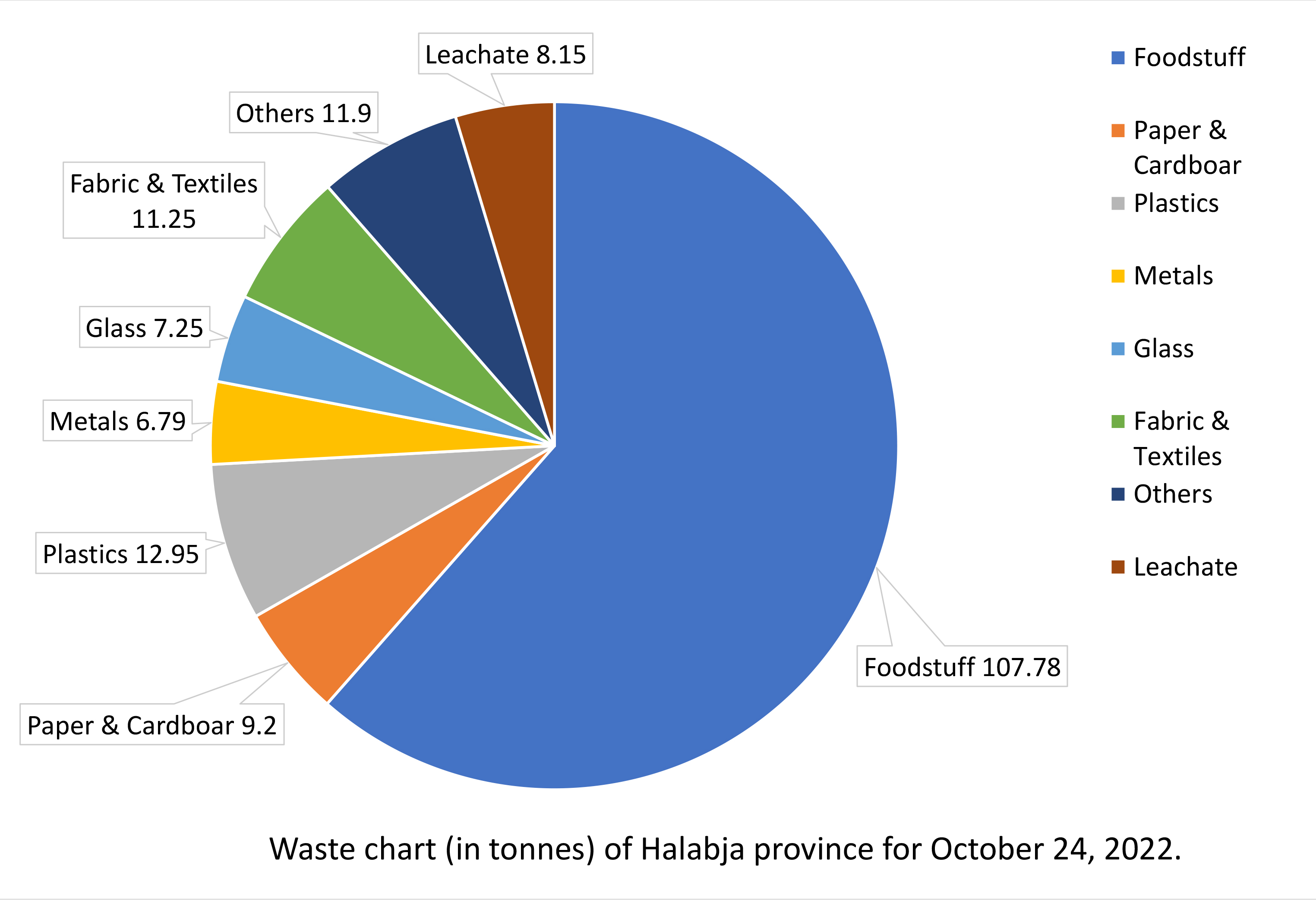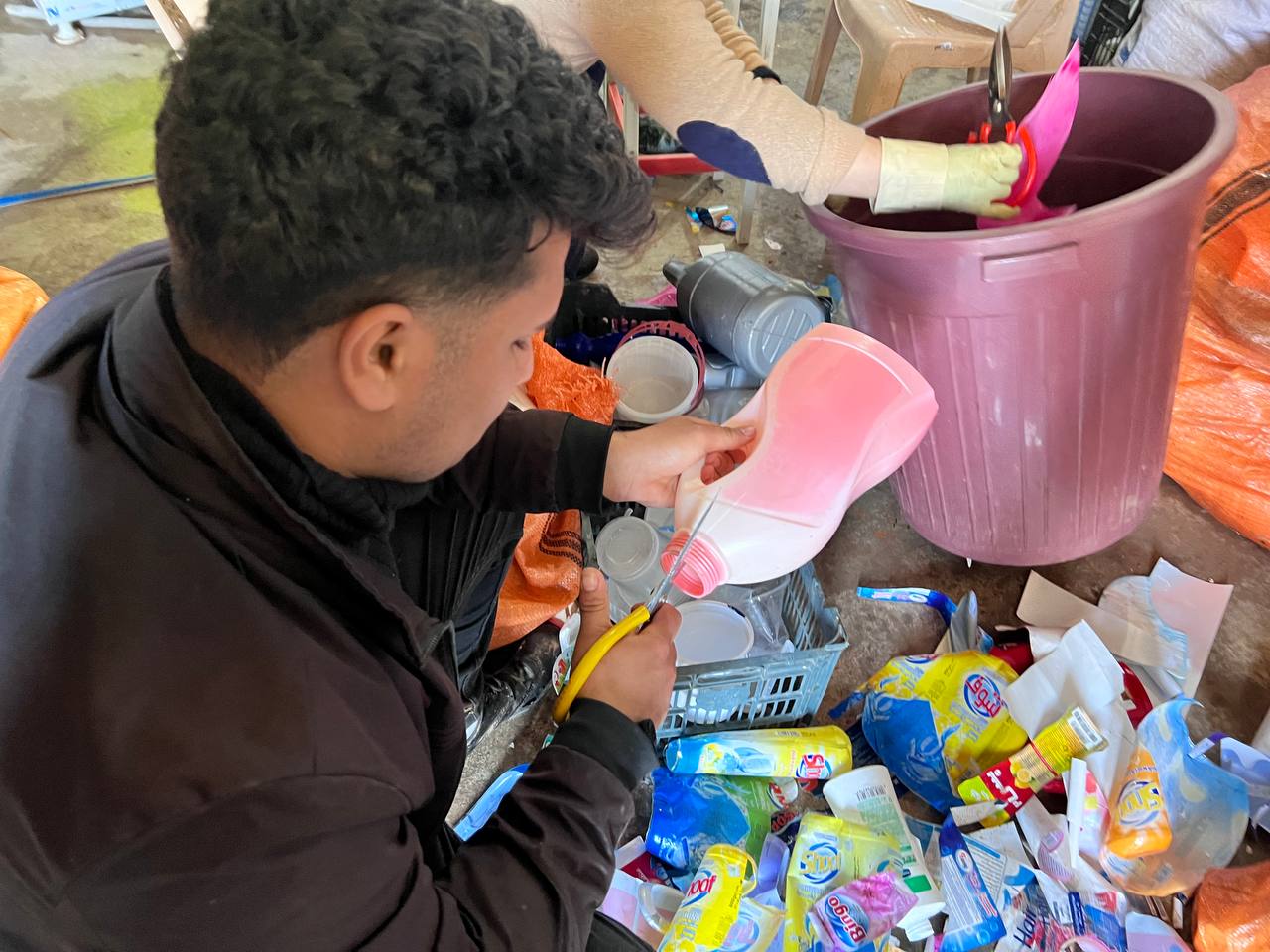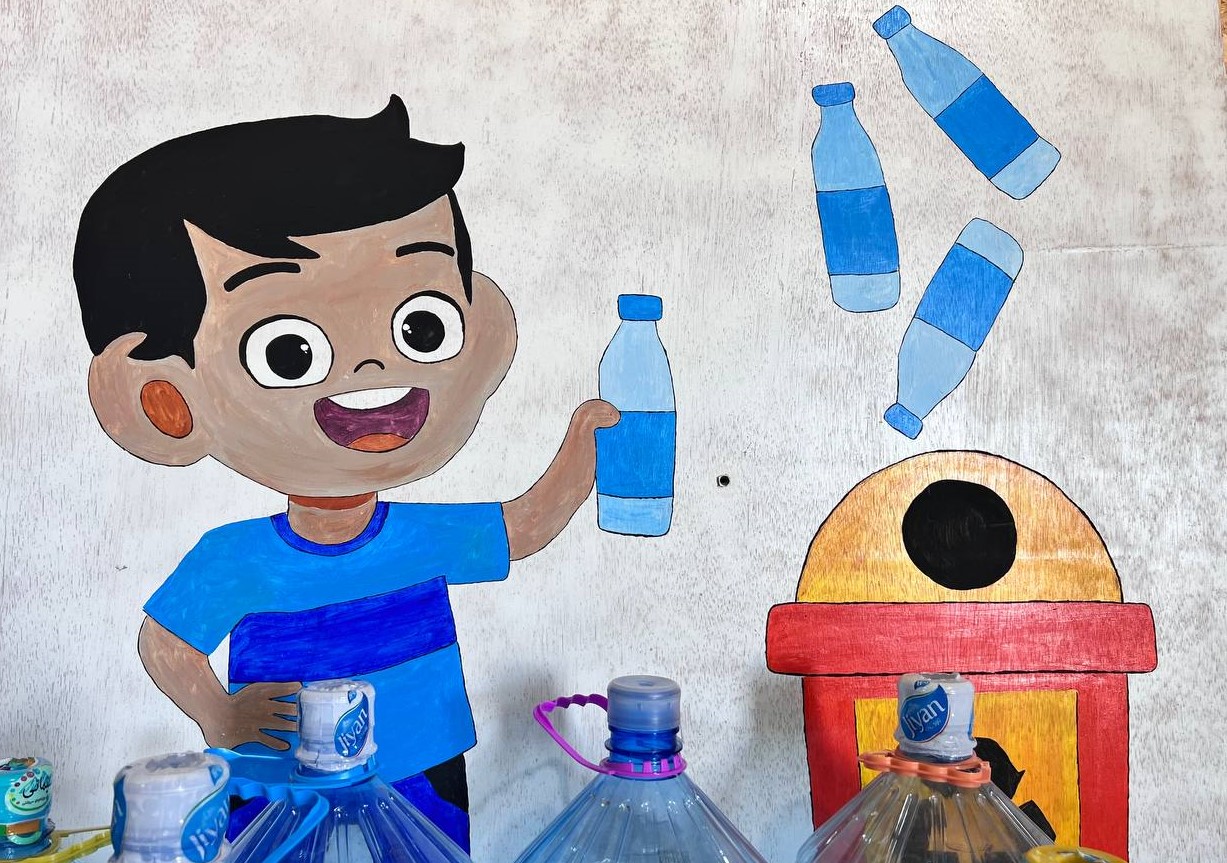As the bombardment of plastic waste is underway, several vigilant boys and girls in Halabja, Iraq, want to reduce environmental pollution through a recycling factory.
More than 150 tonnes of garbage is collected daily in the Halabja province, located 240 km northeast of Baghdad. According to a table approved by the Halabja Municipality, only on October 23, 2022, about (153) tonnes of garbage have been collected in the five municipalities of the province, of which about 13 tonnes of plastic waste, over 7.5 tonnes were inside the city of Halabja.
Most of the waste is eventually dumped underground, leaving an impact for decades. Most of Halabja's garbage is dumped in a ditch several kilometers outside the city, near the lovely village of Tapa Kura.
Shinyar Yadgar Mawlud, an electrical engineer and supervisor of the Shred Up Halabja Recycling Center, said the purpose of the initiative has two main objectives: first, to boost environmental awareness about the harmful effects of plastics and encourage people not to use plastics at all, and if they do, send them back for recycling. The second is to clean up the environment of Halabja from the piles of plastic waste.

Halabja is likely to become the newest province in Iraq. On March 16, 2023, the Iraqi Council of Ministers approved the bill to turn Halabja from a district into a province. The draft bill was sent to the Iraqi parliament to endorse the bill and approve Halabja as the nineteenth province of the country.
March 16 marks the anniversary of the chemical attack on the city by the former Iraqi regime in 1988, in which 5,000 people were killed, and 10,000 others were injured.
The chemical attack on Halabja has caused a human and environmental disaster as its effects are still visible. Emad Fairuz, director of the hospital for treatment of chemical weapons victims in Halabja, said, "Of the 2,300 chemical weapons patients who regularly visit the hospital for treatment, 2,000 are from Halabja".
The population of Halabja province is 68,958 people, according to the Central Statistical Agency of the Iraqi Ministry of Planning in 2019. However, according to the Halabja office of the Independent High Commission for Elections and Referendum in the Kurdistan Region, the population of the Halabja city center is 80 thousand and 940 people.
Shinyar was not born during the chemical bombardment of Halabja, but she says she has many memories of the environmental disaster through her parents, despite the human damage.
"Yes, yes! They keep telling me that most of the animals, both domestic and wild, have perished; they have seen their remains scattered on the ground. They say that most of the trees in the city have dried up and died.”
Blur beginning, clear path
It is the beginning of a new day at the end of March. Shinyar has transformed herself beautifully and is ready to tell the story of her project. The other members of the team have filled the factory with positive energy; six employees work daily in the factory, which covers an area of only 250 square meters.
The Shred Up recycling plant in Halabja has passed through two stages; the first phase of environmental awareness began with awareness raising in schools and the distribution of special bins for plastic collection. In each school, students were divided into groups and educated about the importance of protecting the environment.
The second step was the installation of the factory equipment, which cost about 10,000 American dollars USD.
“Most of the equipment is locally manufactured,” Shinyar says. The aim of manufacturing the equipment locally is that if someone or another party wants to launch a similar project, they can provide them with the necessary guidance and assistance.
On March 16, 2022, the Recycling Center in Halabja was launched by Wadi, a German non-profit organization. New Organization in Halabja, and the Shred Up NGO are also partners in this project. The Halabja recycling project is one of the projects funded by Wadi, Association for Crisis Assistance and Development Cooperation.
Wadi, which means valley in Arabic, has been supporting various projects to empower women and youth in the Middle East for more than 30 years.
After the success of the Halabja recycling experiment, we decided to take the project to other places that have suffered great environmental damage
Bakhan Jamal, Wadi's project supervisor, said the Halabja project was an experiment to see if such projects can be implemented locally.
"After the success of the Halabja recycling experiment, we decided to take the project to other places that have suffered great environmental damage, including Kifri and the Kaparto IDP camp in Duhok,” Jamal said.
Plastic waste is collected from schools, homes, and other public places and transported to the factory. Although plastic has many uses, people have become accustomed to dispose it of immediately after its first use. Such practice has adverse environmental, health, economic, and social consequences.
About 400 million tonnes of plastic waste are produced worldwide annually. According to the United Nations Environment Program (UNEP), one million plastic bottles are purchased every minute; about five trillion plastic bags are used worldwide annually. Overall, half of all plastic products are disposable.
"The legal way ensures the limited use of plastic," said Sarwar Qaradaghi, director of the Kurdistan Nature Organization, a civil society organization. In April 2021, the organization submitted a draft bill to the Iraqi Kurdistan Parliament to limit the import and production of plastics. Parliament has sent the proposal to the Kurdistan Regional Government (KRG) for their position, but "the process has stopped there.”
Article 3 of the bill calls to double taxes on imported plastic materials and on domestic plastic products by 75%. Meanwhile, Article 4 prohibits the use of plastic materials.
There are seven types of plastic in general and the Halabja factory accepts all types. Some are unfit for reuse because they release harmful gases during boiling or heating. The first type is pressed and transported to the large factories in Sulaymaniyah; Type II (HDPE) and Type V (PP) are recyclable.
Mawlud illustrates the types of plastic that are reproduced in the factory. Video by Salam Omar
Milad Mohammed Mahmoud, still a student at Industrial High School, works on the project. Milad is in charge of transporting plastic waste from cafeterias, schools, and other public places to the recycling center.
He transports plastic waste from schools to the factory every Sunday and collects plastic waste from tea houses, cafeterias, and other places every Monday, Milad said.
The factory's products made from plastic waste include chairs and tables, pots, baskets, pen holders, and similar items.
"Our products are melted at high temperatures and are not harmful when used, “according to Shinyar. “The launch of the project was initially warmly received, but this year's reception was "much, much more than that."
After the production phase, the teachers and students were more excited to support. Shinyar says she recommends the opening of two or three more similar plants in Halabja in the future.
Selfie of pride
The Halabja Recycling Center has made an impact on different levels. During the first year of the project, 50 schools have benefited from the awareness campaign. The city has 141 schools, including kindergartens, primary and secondary schools.
“The most important thing is the educational aspect. Young child learns about recycling, and they see the process with their own eyes. I would have loved to study and work in such a field if I had passed such a program while I was a student.”
Hawar Mustafa Hama Ali, the principal of Shahid Azad Hawrami Primary School, said the vision of our school and the goal of the recycling center are consistent, so it is "effective.”
Regarding the change in students' behavior toward plastic waste, she said, “Certainly, certainly, it was very impressive for them to see the recycled products when the center sent us their items.”
I collect about 600 bottles of water a week and then the factory workers transport it
Hawar is the principal of 367 students, all of whom are familiar with the campaign. She said environmental issues should be made a goal of schools. “It should be turned into collective duty.”
Another aspect of the project is the recycling aspect because it prevents all the plastic from being dumped into the environment of Halabja.
Shiram Jamil is the owner of a cafeteria in Halabja, where the Halabja factory has installed a basket for the collection of water plastic bottles. “The basket fills up quickly. I collect about 600 bottles of water a week and then the factory employees transport it.”
Meanwhile, another outcome is building a network between schools, public places, and restaurants. “There are few parties, including the government, that connect these places. When we first started, there was only a blurred road, we didn't have a clear vision, we just had some devices,” said Shinyar.
“When we made the first piece of the first product, I held it in my arm and took selfies with it and shared it on social media, I was so proud of it," she added.
According to Bakhan Jamal, “the project has been very successful. This is the first time we have a successful example of a plastic collection system in Halabja;
"Cooperative and uncooperative"
It is not that easy either. During the first year of the initiative, the team of the project faced various obstacles, including financial ones; the factory not yet reaching the level of profitability, and expenses exceeding total revenues.
“One of the barriers is finding customers at good prices for the unrecycled plastics that are collected. ... The next step is to be able to run the center without financial assistance,” said Wadi's project supervisor.
Although project supervisors talk about municipal and educational support, they say the government should be more enthusiastic about such projects.
“I can't say they're not cooperating at all, but I can't say they're also cooperating, they are on the fence. They know we exist; they like it, but there is no big initiative from their side,” she said.

An employee of the recycling center is busy separating plastic, Halabja, March 30, 2023. Salam Omar
Meanwhile, the head of the Halabja Environment Office, Sarhang Abdulrahman, said, "We think it is a very good project and we have welcomed the team and offered them all facilities. It will have more impact if it is expanded.”
“I have a suggestion to talk to the company that collects garbage in Halabja so that they can collect the plastic and not mix it with other garbage,” Abdulrahman added.
Another dimension of the project is that environmental issues should be made a regular subject in schools. Teachers should discuss the issues with students and remind them of their importance.
“We are unable to visit schools every three months and remind them about it. But if there are school classes on the environment, we can make it easier with the help of teachers,” Shinyar said.
Now, a year later, the factory started selling its products; most of the customers are young as well as university students.
The reason for the project's launch is to provide a free environment for innovation. “We are free to express our opinions and innovate. Wherever people who work are given the opportunity to use their abilities, beautiful things happen,” she says.
“Sometimes you may be small, but be able to make a big impact,” was Shinyar’s last quote, before telling the last part of her story of the factory and heading off to the next mission of the day outside the facility.





